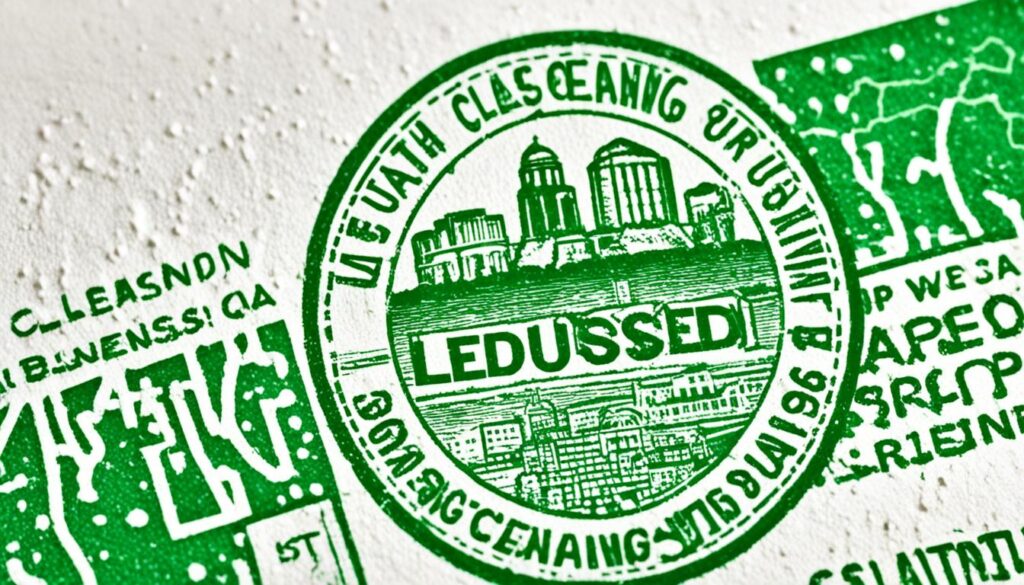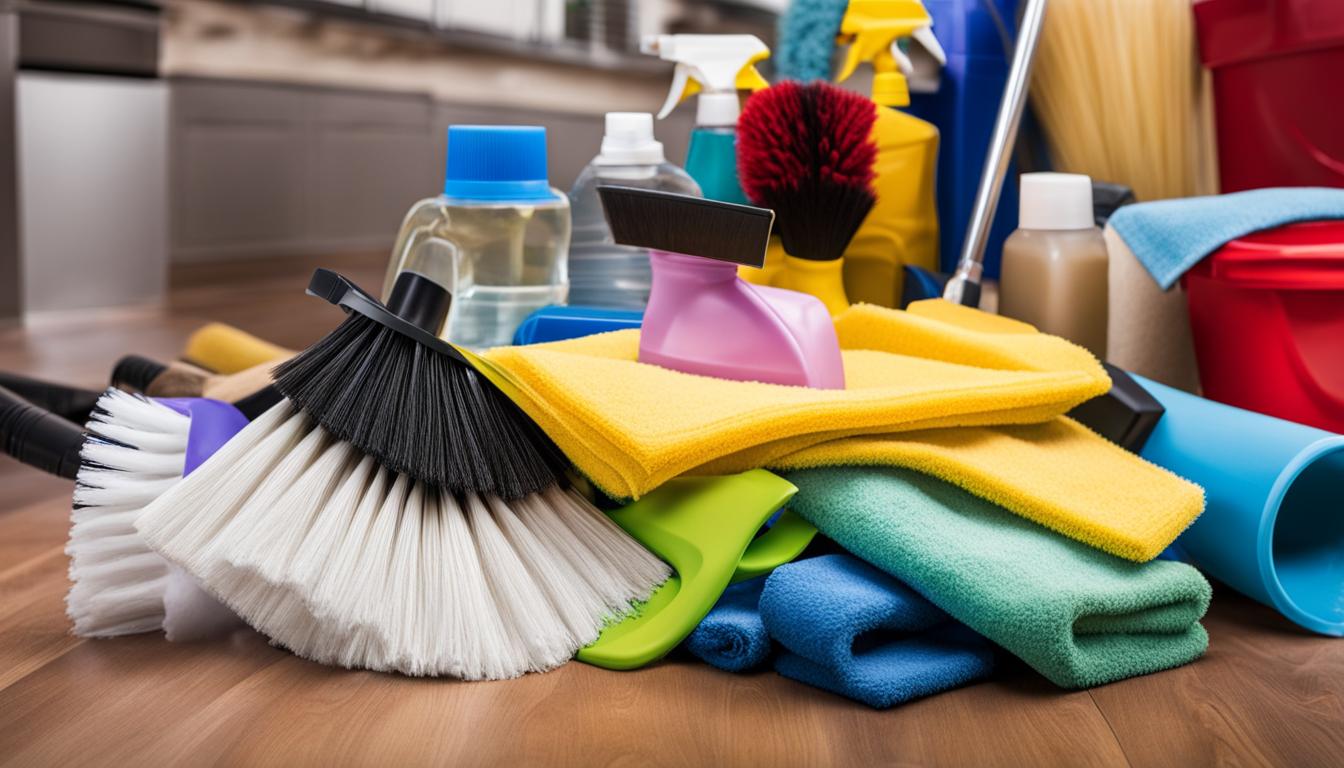Starting a cleaning business in Utah can be an exciting and rewarding venture. With the increasing demand for cleaning services in the state, there are abundant opportunities to establish a successful cleaning business. However, launching a cleaning business requires careful planning, thorough research, and compliance with legal requirements. In this comprehensive guide, we will take you through the essential steps to start a cleaning business in Utah, provide valuable tips and insights, and highlight the necessary licenses and registrations. By following this guide, you will be well-prepared to embark on your journey as a cleaning business owner.
Key Takeaways:
- Starting a cleaning business in Utah can be a lucrative venture due to the growing demand for cleaning services.
- Choosing the right business structure, such as a sole proprietorship, partnership, or LLC, is crucial for your cleaning business.
- While there is no specific cleaning license required in Utah, you may need to obtain a general business license depending on your location and services offered.
- Consider applying for an Employer Identification Number (EIN) to simplify business processes and establish your cleaning business as a separate legal entity.
- Registering your cleaning business with the Utah Division of Corporations and Commercial Code is essential to operate legally.
Choose a Business Structure for your Cleaning Business
Before starting your cleaning business in Utah, it’s important to choose a legal structure that best suits your needs. The three most common options for a cleaning business are sole proprietorship, partnership, and limited liability company (LLC). Each structure has its own advantages and disadvantages, so it’s essential to carefully consider the implications of each before making a decision.
One option is a sole proprietorship, which is the simplest and most common structure for small businesses. As a sole proprietor, you have complete control over your business and its profits, but you are personally responsible for all debts and liabilities.
A partnership is another option, especially if you plan to start the business with someone else. In a partnership, two or more individuals share the responsibilities, profits, and liabilities of the business. It’s important to have a partnership agreement in place to outline the roles and responsibilities of each partner.
An LLC (Limited Liability Company) offers personal asset protection by separating your personal and business liabilities. This structure combines the advantages of a corporation and a partnership, allowing for flexibility in management and tax benefits.
When choosing a business structure, consider factors such as personal liability, taxation, and ease of operation. It’s recommended to consult with a legal professional or business advisor to understand the specific implications of each structure and make an informed decision.
Do I need a cleaning license in Utah?
In general, there is no specific license required to operate a cleaning business in Utah. However, depending on the particular services you offer and the city or county where you operate, you may need to obtain a business license. These licenses are typically issued by the city or county where your business is located and may have specific requirements and fees. It’s important to check with your local municipality to determine the specific licensing requirements for your cleaning business in Utah.
Apply for an EIN (Employer Identification Number) for Utah
An Employer Identification Number (EIN) is a unique nine-digit number assigned by the IRS to identify a business for tax purposes. While an EIN may not be required for all cleaning businesses, it is highly recommended as it can simplify various business processes and help establish your business as a separate legal entity.
To apply for an EIN in Utah, you can do so online through the IRS’s website or by mail or fax using Form SS-4. Having an EIN can also be beneficial if you plan to hire employees or open a business bank account.
The Benefits of Having an EIN
- Establishes your business as a separate legal entity
- Simplifies business processes
- Enables you to hire employees
- Facilitates opening a business bank account
Obtaining an EIN for your Utah cleaning business is a straightforward process. You can apply for it online to receive your EIN immediately, or submit Form SS-4 via mail or fax. Your EIN will serve as your tax identification number and will be required for various business activities.
An EIN is a valuable asset for your cleaning business, providing both legal and operational benefits. Take the necessary steps to apply for an EIN and position your business for success.

File/Register your business with Utah
To legally operate your cleaning business in Utah, you need to register it with the Utah Division of Corporations and Commercial Code. This registration process is an important step in establishing your business and ensuring it complies with the state’s laws and regulations.
The business registration process involves filing the necessary documents and paying the required fees. The specific requirements and fees may vary depending on the type of business entity you choose, such as a sole proprietorship, partnership, or limited liability company (LLC).
To begin the registration process, you will need to gather relevant information about your business, such as its name, address, and contact details. You will also need to provide your chosen business structure and any additional information required by the Division of Corporations and Commercial Code.
Once you have gathered all the necessary information, you can proceed with filing the registration documents. This can typically be done online through the Utah Division of Corporations and Commercial Code’s website. Alternatively, you may choose to file by mail or in-person at the Division’s office.
When filing your registration documents, it is important to ensure accuracy and completeness. Any errors or omissions could potentially lead to delays or legal issues in the future. Take the time to carefully review your documents and make any necessary corrections before submitting them.
Along with the registration documents, you will also need to pay the required fees. These fees will vary depending on the type of business entity you choose and other factors. It’s essential to check the Division’s website or contact their office directly to determine the specific fees applicable to your cleaning business.
By completing the registration process with the Utah Division of Corporations and Commercial Code, you will officially establish your cleaning business in Utah and obtain the necessary legal recognition to operate within the state.
Business License Requirements in Utah
While starting a cleaning business in Utah does not require a specific cleaning license, there are general business license requirements that may vary depending on the city or county where you operate. It is crucial to check with your local municipality to determine the specific licensing requirements for your cleaning business.
In addition to a general business license, you may also need to comply with other filing requirements, such as obtaining a general business tax license or other permits. By understanding and meeting the necessary business license requirements in Utah, you can ensure that your cleaning business operates legally and avoids any potential penalties or fines.
It is important to note that the licensing requirements may differ based on your location and the services you offer. Some cities or counties may have additional regulations or specific licenses for certain cleaning services. Make sure to thoroughly research and review the requirements in your area to ensure compliance.
Obtaining the necessary licenses and permits for your cleaning business demonstrates your commitment to professionalism and legal compliance. It also instills confidence in your potential clients, who may prefer to hire licensed businesses for their cleaning needs.
Remember, staying informed about the business license requirements and maintaining the necessary permits will help you operate your cleaning business smoothly and with peace of mind.

If you’re unsure about the specific steps to obtain a business license in Utah, consult with a local business attorney or reach out to the Utah Small Business Development Center for guidance. They can provide valuable insights and assistance throughout the license application process.
Get Business Insurance
When starting a cleaning business in Utah, it is highly recommended to have business insurance to protect your business and personal assets in case of a lawsuit or other legal claim. Business insurance provides coverage for various risks that your cleaning business may encounter, ensuring that you are financially protected.
There are several types of insurance that you should consider for your cleaning business:
- General Liability Insurance: This type of insurance protects your business from third-party claims for bodily injury, property damage, and advertising liability. It covers legal fees, medical expenses, and property repairs, providing you with peace of mind.
- Worker’s Compensation Insurance: If you have employees, worker’s compensation insurance is essential. It provides coverage for medical expenses and lost wages in case an employee gets injured or falls ill while on the job.
- Commercial Property Insurance: This insurance protects your business property, including equipment, supplies, and inventory from damage or loss due to fire, theft, vandalism, or other covered events. It ensures that you can recover and replace essential assets if they are damaged.
It’s important to work with an insurance provider to determine the appropriate coverage for your specific cleaning business needs. They can assess your risks and provide you with a tailored insurance policy that meets your requirements.
Remember, having business insurance is a crucial step in managing and protecting your cleaning business in Utah.
Conclusion
Starting a cleaning business in Utah requires careful planning and compliance with legal requirements. By following the steps outlined in this guide, you can set yourself up for success and navigate the process of starting a cleaning business with confidence.
First, choose the right business structure that best suits your needs, whether it’s a sole proprietorship, partnership, or limited liability company (LLC). This decision will impact personal liability, taxation, and ease of operation.
Next, register your business with the Utah Division of Corporations and Commercial Code, ensuring all necessary documents are filed correctly and fees are paid. Additionally, check with your local municipality for any specific licensing requirements for your cleaning business.
Don’t forget to protect your business with appropriate insurance coverage. Consider obtaining general liability insurance, worker’s compensation insurance, and commercial property insurance to safeguard your business and personal assets in case of unforeseen events.
Finally, develop a solid marketing strategy to attract and retain clients. Invest in quality equipment and supplies to provide exceptional cleaning services and exceed customer expectations.
By following these steps and incorporating these success tips, you can start and grow a thriving cleaning business in Utah. With dedication and hard work, you’ll be well on your way to building a successful cleaning business.
FAQ
What are the steps to start a cleaning business in Utah?
To start a cleaning business in Utah, you need to choose a business structure, register your business, obtain necessary licenses, and develop a marketing strategy.
What are the legal requirements for starting a cleaning business in Utah?
The legal requirements for starting a cleaning business in Utah include choosing a business structure, registering your business with the Utah Division of Corporations and Commercial Code, and obtaining any necessary business licenses.
Do I need a specific cleaning license to operate a cleaning business in Utah?
There is no specific cleaning license required in Utah, but you may need to obtain a general business license depending on the city or county where you operate.
How do I apply for an EIN (Employer Identification Number) for a cleaning business in Utah?
You can apply for an EIN in Utah online through the IRS’s website or by mail or fax using Form SS-4. An EIN is not required for all cleaning businesses, but it is recommended for tax and business purposes.
How do I register my cleaning business with the Utah Division of Corporations and Commercial Code?
To register your cleaning business with the Utah Division of Corporations and Commercial Code, you need to file the necessary documents and pay the required fees. The specific requirements and fees may vary depending on the type of business entity you choose.
Are there any other licenses or permits I need to obtain for my cleaning business in Utah?
In addition to a general business license, you may need to obtain other licenses or permits depending on the specific services you offer. It is important to check with your local municipality for any additional requirements.
Is business insurance necessary for a cleaning business in Utah?
It is recommended to have business insurance for your cleaning business in Utah. Common types of insurance to consider include general liability insurance, worker’s compensation insurance, and commercial property insurance.
What are some tips for starting a successful cleaning business in Utah?
Some tips for starting a successful cleaning business in Utah include developing a solid marketing strategy, investing in quality equipment and supplies, providing excellent customer service, and staying up to date with industry trends and regulations.




